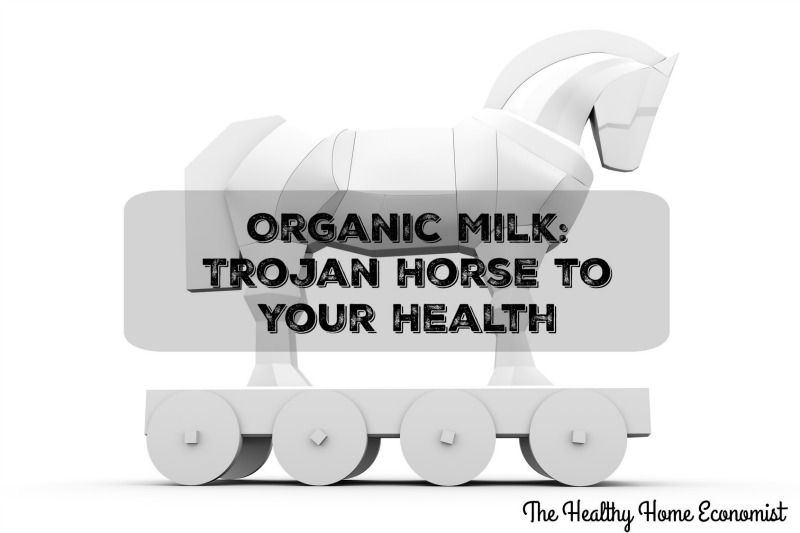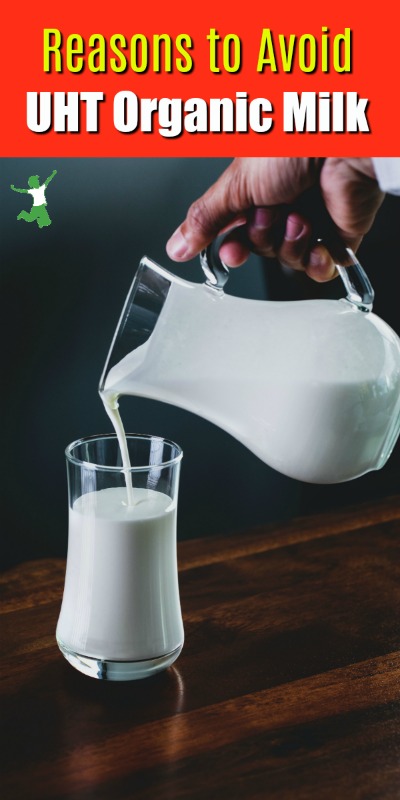Why organic milk that is UHT processed is unhealthy and certainly not a better choice than regular supermarket milk despite the sky-high prices and misleading marketing which leads consumers to believe it is healthy.
Fact: Organic milk companies are pulling the wool over the eyes of the consumer to boost profits.
By marketing their UHT milk as certified USDA Organic, an ever-increasing consumer base willingly buys it. The prices are roughly double the price per gallon of regular, pasteurized store milk. The sad truth is that ultrapasteurized (UHT) organic milk is just as unhealthy as regular, pasteurized store milk.
I’ve often thought if I HAD to choose between them, which milk would I select as being better: regular pasteurized milk from the store or ultrapasteurized organic milk? That’s a toughie. Neither choice is optimal as there is no clear winner.
Both are highly processed milks, both contribute to poor health and chronic illness in general.
Pasteurized Store Milk. Clearly Not Good for You
On the one hand, you have regular, pasteurized store milk that comes from sick, confined cows that are injected with hormones and other drugs. The cows are fed unnatural, GMO, pesticide, and antibiotic laced feed with no access to fresh air or green grass. These poor animals stand on cement floors their entire lives. No surprise that they usually die within about a year and half. Incidentally, the true lifespan for a healthy dairy cow should approach 15 years.
Milk from these confined cows NEEDS to be pasteurized. It is nasty stuff loaded with pus and pathogens because of the filth and chronic mastitis the cows endure.
Ultrapasteurized Organic Milk. Still Bad for You!
On the other hand, you have ultrapasteurized, organic milk. A consumer with only partial knowledge of how milk is processed is easily lured into buying this milk. On the surface, it seems so much healthier. After all, the cows don’t get any antibiotics, steroids or hormones, right? It’s certified USDA Organic. Doesn’t that mean something?
While the cows producing organic milk may not be subjected to the drugs and antibiotics used on conventional dairy operations, the milk coming from an organic-industrial complex is even more highly processed. For example, ultrapasteurized (UHT) organic milk must be subjected to a temperature of 280F for at least 2 seconds.
This compares with standard pasteurization temperature of about 161F. Such a high temperature results in a product that has extended shelf life. UHT milk can remain unrefrigerated for up to 6 months in aseptic packaging.
I find it outrageous that Organic Valley and Horizon frequently display their aseptically packaged, organic dairy in the refrigerated section of the health food store!
Turns out that consumers (particularly those in the US) are much more likely to be duped into buying organic milk if it is displayed in the refrigerated section. Buying organic milk unrefrigerated on the shelf goes against intuition and just doesn’t seem very natural, does it?
Moms buy individually sized aseptic packages of Organic Valley milk and put them in their children’s lunchboxes with ice packs! If they only knew that this milk is so dead that it doesn’t even require refrigeration they might rethink their choice of beverage.
Auto-Immune Disorder Link
Why is ultrapasteurization so bad? The high temperatures used to ultrapasteurize organic milk damage the fragile milk proteins totally and completely. The same thing happens when sweetened condensed milk is manufactured too.
When this happens, the enzymes the body produces to digest these proteins do not work as they no longer “fit together” like puzzle pieces. The undigested proteins then make their way into the bloodstream due to “leaky gut” syndrome, which nearly all Westerners suffer from to some degree. At that point, the body identifies them as foreign proteins and mounts an immune response.
This translates into symptoms better known as allergies, asthma, eczema, and other symptoms of autoimmune disorders! Ultrapasteurized milk is so completely sterilized that sometimes it cannot even be cultured into homemade kefir or yogurt.
This stuff is dead, dead, dead folks.
There is no way that it can be considered healthy even if it is labeled USDA organic.
The enhanced immune response that occurs from drinking ultrapasteurized milk has the potential to lead to milk and dairy allergies pretty quickly. I remember when my first child was nursing, I drank a lot of Organic Valley ultrapasteurized milk.
My son spit up so badly during that time that there was some concern that he had a reflux disorder. Remarkably but not surprisingly, when I stopped drinking the Organic Valley milk, his reflux problem resolved. No treatment was required.
I have no doubt that if I had continued drinking this milk and had weaned my son onto it that he would undoubtedly have a milk allergy today. Fortunately, I wised up in time to get off that poison!
Trading Drug/Pesticide Residues for Estrogen Mimickers
While a consumer may be reducing his/her exposure to antibiotic and pesticide residues by choosing Organic Valley milk, this is by no means a guarantee to less chemical exposure. Processors of organic milk frequently heat the milk to the required 270F AFTER the milk is in the aseptic package or plastic jug! Another option, just as bad, is to fill the package or jug with boiling hot milk that has not yet cooled down!
This releases high levels of endocrine-disrupting phthalates (the notorious BPA as well as several others) used in the packaging into the milk! Most everyone now knows never to heat food in a microwave with plastic wrap on top for this very reason. It’s a shame more people aren’t aware of the tremendous endocrine-disrupting potential of drinking ultrapasteurized, organic milk!
What to Drink Instead of UHT Organic Milk
As you can see, it is an extremely hard decision to pick which milk is more unhealthy: regular pasteurized store milk or ultrapasteurized organic milk.
Better not to have to make the decision at all! Seek out fresh raw grassfed milk straight from the cow (or goat) from a farmer in your local area. And, if you are fortunate enough to have a source for this type of health-giving milk, don’t run out and buy a half-gallon of ultrapasteurized organic milk if you temporarily run out of the fresh from the farm variety. In those situations, it is best to simply go without. The risks from consuming UHT organic milk even on occasion are simply too enormous to ignore.
Another option is to make healthy milk substitutes like this recipe for coconut milk tonic or homemade sprouted oat milk until the next local dairy delivery.

More Information
101 Uses for Raw Soured Milk
Tips for Freezing Milk and other Dairy Products
A1 and A2 Milk: Do Cow Genetics Even Matter?








Thanks for that information. Even though I found out organic UHT milk taste a lot better then store pasteurized milk which has a “funny” taste not present in organic or UHT milk.
I started to buy local milk from Wholefoods that is cream top low pasteurized. I have no reaction to that. But I bought ultra pasteurized Horizon half and half from Costco and drank with coffee. I have to take a ton of benadryl. My throat has swelled, my fingers and face is puffy. I also had no reaction to Boars Head Gouda. Does that make any sense?
Yes Diana, the article DOES say “These cows stand on cement floors their entire lives and usually die within about a year and half. Incidentally, the true lifespan for a healthy dairy cow should approach 15 years.”